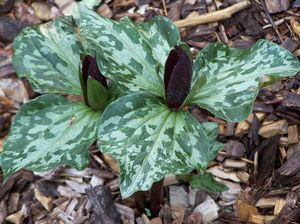View All Plants :: View All SHADE PERENNIALS
Trillium cuneatum
Common Toadshade
Plant Type:
SHADE PERENNIALSTrillium cuneatum – Common Toadshade also known as Sweet Betsy. This is a beautiful species with 1” to 1.5” upright spatulate petals in a dark maroon shade. The mid to late spring flower erupts over a gorgeous tapestry of irregularly mottled foliage in shades of green, bronzy brown to red-brown. Each ovate leaf may grow to 6” in length. The Common Toadshade, T. cuneatum, is a very showy species – we think not at all common! There is some confusion on our part as to whether or not this might actually be T. sessile... We're going with T. cuneatum. Russell Graham tells us that this might be another species altogether. Whereas he suggests that actual T. sessile is "cute" the plant we have designated as the Common Toadshade is vibrant, showy and relatively large. Apparently many of the sessile-types are simply lumped into this designation. This could possibly be T. cuneatum, T. chloropetalum, T. sessile or another in the complex... Who knows? That's more than rhetorical as there are genuine experts out there who really can distinguish. It may even be a hybrid as trilliums do hybridize with some ease. Whichever it might actually be it is worth it.
Characteristics and Attributes for Trillium cuneatum
Season of Interest (Flowering)
- Spring
Season of Interest (Foliage)
- Spring / Summer
Light
- Morning Sun / Afternoon Shade
- Shade
- Dappled Shade
Attributes
- Woodland
- Border
- Massing
- Rock Garden
- Specimen
Growth Rate in the Garden
- Slow
Soil
- Fertile
- Draining
Origins
- Eastern U.S.
Propagated By
- Division
- Bare Root
Genus Overview: Trillium
Common Name: Toadshade
Trillium is a magnificent woodland genus; most of the 49 taxa (49 according to Don Jacobs whose authority I accept) grace us with their presence right here in North America, a handful in East Asia and nowhere else. They are spring bloomers with many becoming dormant by midsummer. Their structure is basic, this from “American Treasures” by Don L. Jacobs and Rob L. Jacobs: “Adult individuals produce no basal foliage, only a whorl of 3 leaves at the stem summit. Furthermore, all floral parts are in whorls of three: 3 sepals, 3 petals, and 3 seed-bearing carpels jointed into a single pistil with 3 pollen-receptor stigmas.” Henceforth, the “Tri” in Trillium makes simple and elegant sense. Be assured: none of our woodland plants are wild collected. Site Trillium in fertile draining soil in part sun to open shade. They are tolerant of dry summer shade. All our plants are offered by division of their slow growing rhizomes.


